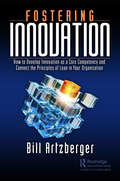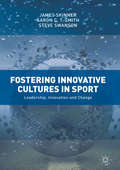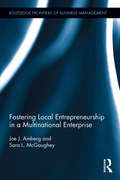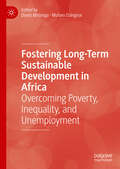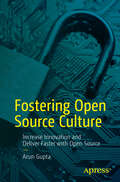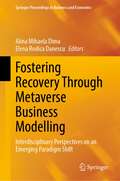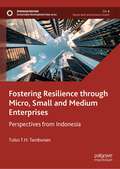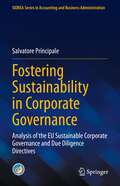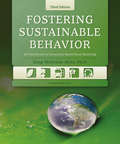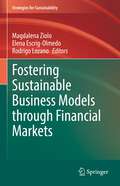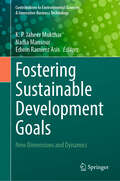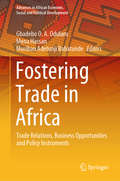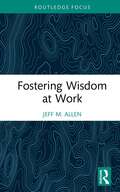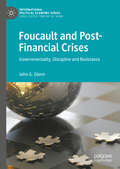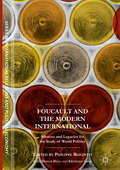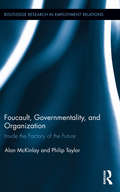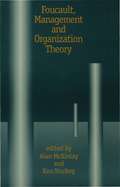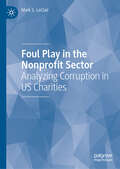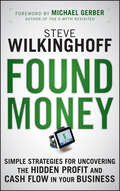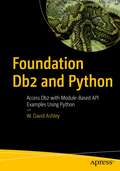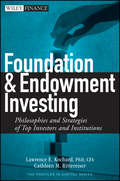- Table View
- List View
Fostering Innovation: How to Develop Innovation as a Core Competency and Connect the Principles of Lean in Your Organization
by Bill ArtzbergerWhile innovation can be defined in many ways, the author sees it as a process. It is not the sudden eureka moment in the middle of the night, nor is it a clear and linear path towards a final destination. Instead, it involves a strong sense of creativity and curiosity. An innovative mind has a natural inclination towards out-of-the-box thinking. It involves a willingness to try something new, without fear or judgment, to develop something no one else has ever articulated. While the mindset comes naturally, it requires fuel to keep it running. Innovators are voracious readers and researchers. They feed their mindset all of the fuel it needs to stay informed and relevant in their field. Many of the same things can be said for the Lean mindset. Lean management doesn’t happen overnight, and it is very rarely a clear and linear path to true Lean thinking. Some might consider Lean a subset of innovative thinking, while others see it in reverse. Regardless of the relationship’s directionality, one thing is certain: You cannot have one without the other. This book follows John Riley, the CEO of a medium-sized valve company just outside of Pittsburgh, Pennsylvania, who will stop at nothing to create an innovative work environment. Through the ups and downs of his journey, he learns a number of Lean and innovative skills, strategies, and mindsets to help him build the business he’s always envisioned for himself. Throughout the book, you see examples of both strong and poor innovative leadership skills demonstrated by each of the main characters. The key messages are ones that help leaders build and access a mindset insistent on continuous improvement. Leadership techniques and abilities that bolster creative thought and problem-solving are the most successful throughout this book. To be truly innovative, you can never stop driving the learning process. For this to happen, leaders need to recognize when there is a need for a change or improvement. This is the beauty of the marriage between Lean and innovation: They both require continuous learning and growth. The desire to improve is only one piece of this equation, however. The other is the willingness to act. Without both of these factors, true innovation will always be out of reach.
Fostering Innovative Cultures in Sport: Leadership, Innovation and Change
by James Skinner Aaron C. Smith Steve SwansonAnalysing the trends that are emerging in sport enterprises such as advancements in technology and social media, the authors of this illuminating book tackle the issue of how to create new opportunities in such a changing industry. Providing valuable reading for sports business scholars, this book draws on examples from inventive companies as well as inspirational sports leaders and illustrates the various drivers behind innovation. Addressing the need for a culture of innovation within sports enterprises, the authors reveal sustainable ways for companies to stay ahead of the game in an increasingly competitive global sport market.
Fostering Local Entrepreneurship in a Multinational Enterprise (Routledge Frontiers of Business Management)
by Joe J. Amberg Sara L. McGaugheyCorporate entrepreneurship involves new business creation within established companies, the strategic renewal of existing business, and, ultimately, the search for sustainable competitive advantage in an increasingly globalised economy. Yet it remains elusive for many firms. In a collaboration between a practitioner and academic, Joe J. Amberg and Sara L. McGaughey explore corporate entrepreneuring within a large conglomerate multinational enterprise: Siemens AG. In early 2009, following a prolonged period of business stagnation and a huge bribery scandal, Siemens’ top management identified a severe lack of entrepreneurship as a critical issue. The strengthening of ‘local entrepreneurship’ became a new priority in the strategic planning for 2010 to 2014. By examining three contrasting ventures in the Siemens business unit Fire Safety between 2008 and 2012, the authors identify key drivers and impediments that sustain inertia in corporate entrepreneuring within this global organisation. This study offers an insightful contribution to our growing – yet still fledgling – understanding of corporate entrepreneurship in global corporations, highlighting the importance of context, interdependencies between critical factors, and the false promise of universal best practice.
Fostering Long-Term Sustainable Development in Africa: Overcoming Poverty, Inequality, and Unemployment
by David Mhlanga Mufaro DzingiraiThis book provides a broad and insightful guide to the economic, social, and environmental concerns seen within Africa. It highlights the central economic challenges faced by African countries and outlines ways in which long-term sustainable development in Africa can be achieved. A particular focus in given to issues of poverty, inequality, and unemployment and how poor infrastructure, limited healthcare and education, and environmental deterioration are exacerbating these issues. By looking at the limited effectiveness of traditional development initiatives, a new framework for economic development is presented that focuses on community ownership and long-term sustainability and which acknowledges the history of colonisation, economic exploitation, and political instability that has held Africa back in the past.This book takes hope from countries within the Global South that have moved towards sustainable development and sets out ways in which other countries can follow them. It will be relevant to students, researchers, and policymakers interested in development and environmental economics.
Fostering Open Source Culture: Increase Innovation and Deliver Faster with Open Source
by Arun GuptaOpen source accounts for approximately 90 percent of modern software development, yet the demand for such technology skills continues to grow. Consequently, companies are having a difficult time hiring the right talent. Based on author Arun Gupta’s experiences with leading companies such as Apple, Amazon, Sun Microsystems, and Intel this book highlights the importance of an open source culture and shares proven techniques by which one can be built and nurtured. Many open source code maintainers feel there is a need for an open source culture in their company so that business needs can be met more efficiently. This book explains why it is important to have a business alignment with open source and the purpose of an Open Source Program Office. It will explain the value of InnerSource, internal events and leveraging external open source communities in building an active workplace culture. Fostering Open Source Culture is packed with over 40 industry case studies and actionable steps organizations, both large and small, can take to have a fully functioning open source work culture. What You Will Learn Understand the key principles of open source and the benefits of FOSS software Examine proven techniques that can be used to foster an open source culture within an enterprise and is directly tied to your business objectives Review exclusive case studies from a wide range of enterprises on how they foster open source culture Who This Book Is For Senior tech leaders and executives (CTOs, CIOs, CISOs), legal teams, HR personnel, marketing executives, and sales teams who want to know how open source can be used across the company to innovate faster and improve security of products.
Fostering Rapid Advances in Health Care: Learning from System Demonstrations
by National Research CouncilIn response to a request from the Secretary of the Department of Health and Human Services, the Institute of Medicine convened a committee to identify possible demonstration projects that might be implemented in 2003, with the hope of yielding models for broader health system reform within a few years. The committee is recommending a substantial portfolio of demonstration projects, including chronic care and primary care demonstrations, information and communications technology infrastructure demonstrations, health insurance coverage demonstrations, and liability demonstrations. As a set, the demonstrations address key aspects of the health care delivery system and the financing and legal environment in which health care is provided.
Fostering Recovery Through Metaverse Business Modelling: Interdisciplinary Perspectives on an Emerging Paradigm Shift (Springer Proceedings in Business and Economics)
by Alina Mihaela Dima Elena Rodica DanescuThrough the lens of multi- and interdisciplinarity, this book highlights the potential of progress in cloud computing technologies, metaverse development, and digital transformation in charting a path to economic and social recovery, governance process and societal evolution enabling to tackle the global polycrises triggered by the Covid-19 pandemic in 2020. The book is an outcome of the 5th International Conference on Economics and Social Sciences, ICESS 2022, Bucharest, Romania.
Fostering Resilience through Micro, Small and Medium Enterprises: Perspectives from Indonesia (Sustainable Development Goals Series)
by Tulus T.H. TambunanThis book focuses on the development of Micro, Small and Medium Enterprises (MSMEs) in Indonesia based on various primary and secondary field surveys. In doing so, the book provides a regional comparison of countries in Asia- Pacific, covering issues such as employment generation, formation of gross domestic product (GDP), export development, development constraints, productivity, and investment. To achieve this, the book analyzes the role of partnerships between MSMEs such as large companies, banks and government institutions, and the role of cooperatives. It also includes studies on women’s entrepreneurship in Indonesia, and also explores the crisis mitigating measures (CMMs) widely adopted by MSMEs affected by financial crises in the past. Finally, the book also examines the development of financial technology (FinTech), and in particular peer-to-peer (P2P) lending and how this can serve as an alternative source of funding for MSMEs in Indonesia. Aspects of this book would be useful to students, researchers, practitioners, and also those interested in economic-related sustainable development goals (SDGs), given the importance the United Nations (UN) has assigned to MSMEs for taking a lead in employment creation, and poverty eradication.
Fostering Sustainability in Corporate Governance: Analysis of the EU Sustainable Corporate Governance and Due Diligence Directives (SIDREA Series in Accounting and Business Administration)
by Salvatore PrincipaleThe effects of climate change on the one hand, and government promises to achieve sustainable development on the other, are only two examples of the factors driving businesses to incorporate sustainability into their business strategies. International organizations and researchers alike contend that incorporating sustainability into business is only feasible when governance also considers environmental, social and governance (ESG) issues. Therefore, corporate governance is attracting more and more attention from investors and various stakeholders. On 23 February 2022, the European Commission adopted a proposal for a Directive on corporate sustainability due diligence. The aim of this Directive is to foster sustainable and responsible corporate behaviour and to anchor human rights and environmental considerations in companies’ operations and corporate governance. Drawing on the theoretical framework of corporate governance and an analysis of the latest and most important literature on corporate governance and sustainability, this book offers essential insights, particularly in light of the Sustainable Corporate Governance Directive and Due Diligence Directive.
Fostering Sustainable Behavior
by Doug Mckenzie-MohrTo attain a sustainable future, we must change many of our everyday actions. This completely revised and updated edition of Fostering Sustainable Behavior shows how community-based social marketing is key to overcoming barriers and resistance, and creating new social norms.
Fostering Sustainable Business Models through Financial Markets (Strategies for Sustainability)
by Magdalena Ziolo Rodrigo Lozano Elena Escrig-OlmedoThe aim of this volume is to foster more sustainable business models through financial markets. To that end, it is necessary to know the main global challenges facing financial markets and their impact on creating sustainable value in business models of enterprises in the context of sustainable adaptation. The book focuses on assessing the decision criteria adopted by financial markets in the process of transaction risk valuation, in terms of the presence of Environmental, Social, and Governance (ESG) criteria, and by assessing the impact of including these criteria in the risk assessment process by financial markets in business decisions, leading as a consequence to building new value in the form of a sustainable business model. The book presents global ESG risks facing the financial markets, and discusses how ESG risks are managed and monitored, and how financial markets can measure and operationalize extra-financial risks in its assessment process. The book also analyses ESG risk implications and influences on company behavior, and the actions that companies should take considering the ESG assessment requirements of financial markets. Finally, it provides a comprehensive, structured, and systematic view of how financial markets and companies should adapt and improve their business models. The book provides unique challenges for investors, companies, financial markets, and for our society as a whole, advancing traditional risk management approaches to address global risks.
Fostering Sustainable Development Goals: New Dimensions and Dynamics (Contributions to Environmental Sciences & Innovative Business Technology)
by Nadia Mansour K. P. Jaheer Mukthar Edwin Ramirez AsisThis proceedings is a compilation of results from the International Multi-disciplinary Conference on “Fostering Sustainable Development Goals (SDGs) – New Dimensions and Dynamics”, which took place on July 27th and 28th, 2023, in Bengaluru, India. The volume presents cutting-edge research, analysis, and innovative perspectives that shed light on the United Nations' Sustainable Development Goals (SDGs). It guides policymakers, researchers, academics, and practitioners towards actionable solutions for a sustainable future.In the 21st century, sustainable development is crucial to address global challenges such as climate change, social inequality, technological advancements, and innovative business. The book offers fresh insights and strategies to overcome challenges and accelerate progress towards the SDGs. The book also explores different dimensions of sustainable development, including innovative business models, technological advancements, economic growth, and environmental preservation, providing a holistic understanding of the challenges and opportunities. It analyzes the interconnectedness of the SDGs, guiding policymakers in effective policy design and implementation.Practical case studies and success stories from around the world demonstrate how innovative approaches have achieved tangible progress towards the SDGs. The book inspires readers and showcases the transformative power of sustainable development initiatives.The book emphasizes inclusivity and equity, recognizing the interlinkages between dimensions of sustainable development. The volume explores the challenges faced by marginalized communities, highlighting their empowerment as a catalyst for sustainable development.
Fostering Trade in Africa: Trade Relations, Business Opportunities and Policy Instruments (Advances in African Economic, Social and Political Development)
by Gbadebo O. A. Odularu Mena Hassan Musibau Adetunji BabatundeThis book discusses trade relations and facilitation issues at both the regional and the continental African level, highlighting the increasing business opportunities and challenges that confront Africa in the digital age. It also examines the effects of trade policies and other policy instruments on Africa’s economic development and presents workable policy measures for a more business-friendly ecosystem. Discussing various topics, including trade relations between African countries, African and international trade agreements, and trade liberalization policies, the book appeals to scholars of economics, business and management as well as professionals and policymakers interested in fostering free trade and sustainable business development in Africa.
Fostering Wisdom at Work (Routledge Focus on Business and Management)
by Jeff M. AllenMost people can name dozens of knowledgeable people in their private and business lives, but highly value the very limited number deemed as wise. The fields of gerontology, psychology, and social science have attempted to study the phenomena of wisdom with little significant clarity or understanding of the construct within the expansive workforce development field. Wisdom, as an important aspect of a growing global knowledge economy, lacks the frameworks and theories needed for fostering workplace wisdom. This book brings a scholarly scrutiny to the study of wisdom, propelling the attribute to prominence within the broad field of workforce development and particularly within the growing context of a global knowledge economy. It investigates the characteristics of wisdom and offers theories, frameworks, techniques to foster wisdom in the workplace, recognizing it as a vital key to success for individuals and society. The ideal audience of this book includes senior learning specialists, organization development managers, HRD directors and workforce scholar-practitioners. These key individuals in organizations understand talent management and have a vested interest in the career construction of individuals in their organizations.
Foucault and Managerial Governmentality: Rethinking the Management of Populations, Organizations and Individuals (Routledge Studies in Management, Organizations and Society)
by Alan McKinlay Eric PezetIn the last two decades there has been an explosion of research inspired by Michel Foucault’s suggestion of a new concept, ‘governmentality’. The distinctive feature of modern governmentality is that across all sorts of fields, rule is predicated upon the active subject as the vehicle through which—and by which—power is exercised. The appeal of governmentality is that, whether we are considering the workplace, the school or welfare regimes, it opens up new ways of looking at familiar institutions. Foucault and Managerial Governmentality is about Michel Foucault’s concept of governmentality. The novelty of this concept is that looks at the ways that populations and organisations are imagined in ways that premise collective gains through expanding individual freedoms. Specifically, how are technologies of freedom devised that improve the overall performance—health, productivity, or parental responsibility—of a given population? Understanding the operation of technologies of control is a simple enough task, argues Foucault, but also one that blinds us to the increasing prevalence of technologies of freedom. Foucault and Managerial Governmentality aims not just to locate this concept in Foucault’s wider research project but to apply it to all sorts of management techniques. By applying governmentality to questions of management and organization we will also develop Foucault’s original, somewhat sketchy concept. This book has three innovative narratives: an awareness of the historicity of the concept; the application of governmentality to specific forms of management means that we escape the temptation to read any and all forms of technology and organization as an expression of neoliberalism; and, finally, the interviews with Peter Miller and Nikolas Rose provide unique intellectual and personal insights into the development of the governmentalist project over the last thirty years.
Foucault and Post-Financial Crises: Governmentality, Discipline and Resistance (International Political Economy Series)
by John G. GlennThis title explains the causes of the financial crisis and the economic reforms that were created subsequently through a Foucauldian philosophical lens. The author sets out the approaches established by Foucault – namely governmentality, biopolitics and disciplinary mechanisms – explaining how these influenced the shift of production from a local to a global level, alongside a shift towards financialisation. Glenn applies Foucauldian principles to aid understanding of the self-corrective mechanisms applied to the financial system, and the interpellative processes that led to the emergence of a new mode of subjectification. Concurrently, this title examines the retreat of the state from the financial sphere. This shift, the author posits, did not mean the complete absence of governance; rather governance became more concerned with ensuring that financial behaviour was contained within certain limits.
Foucault and the Modern International: Silences and Legacies for the Study of World Politics (The Sciences Po Series in International Relations and Political Economy)
by Philippe Bonditti, Didier Bigo and Frédéric GrosThis book addresses the possibilities of analyzing the modern international through the thought of Michel Foucault. The broad range of authors brought together in this volume question four of the most self-evident characteristics of our contemporary world-'international', 'neoliberal', 'biopolitical' and 'global'- and thus fill significant gaps in both international and Foucault studies. The chapters discuss what a Foucauldian perspective does or does not offer for understanding international phenomena while also questioning many appropriations of Foucault's work. This transdisciplinary volume will serve as a reference for both scholars and students of international relations, international political sociology, international political economy, political theory/philosophy and critical theory more generally.
Foucault, Governmentality, and Organization: Inside the Factory of the Future (Routledge Research in Employment Relations)
by Philip Taylor Alan McKinlayThis book traces how abstract managerial ideas about maximizing production flexibility and employee freedom were translated into concrete, day-to-day practices at the Motorola plant in East Kilbride, UK. Using eyewitness accounts, the book describes how employees dealt with the increased freedom Motorola promoted amongst its employees, how employees adapted to managerial changes, specifically the elimination of large-scale management, and where the ‘managerless’ system came under strain. This book will be of essential reading for researchers, graduate students, and undergraduates interested in the areas of management studies, human resource management, and organizational studies, among others.
Foucault, Management and Organization Theory: From Panopticon to Technologies of Self (Organization Studies)
by Ken P Starkey Professor Alan McKinlayThis volume draws together critical assessments of Michel Foucault's contribution to our understanding of the making and remaking of the modern organization. The volume provides a valuable summary of Foucault's contribution to organization theory, which also challenges the conventions of traditional organizational analysis. By applying Foucauldian concepts such as discipline, surveillance and power/knowledge, the authors shed new light on the genesis of the modern organization and raise fresh questions about organization theory. The bureaucratic career is, for example, analyzed as a disciplinary device, a mechanism that seeks to alter rational choice rather than constrain bodies. This raises questions about Foucault's linking of the modern organization's birth with the enlightenment. Other contributions review the impact of totalizing managerial discourses and the limits and possiblities of resistance, and question the profound pessimism of Foucault. The volume concludes by examining the implications of Foucault's later work in which he suggests that people are much freer than they feel.
Foul Ball: My Life And Hard Times Trying To Save An Old Ballpark (RosettaBooks Sports Classics)
by Jim BoutonA rollicking and &“compelling&” true story of baseball, big money, and small-town politics by the author of the classic Ball Four (Publishers Weekly). Host to organized baseball since 1892, Pittsfield, Massachusetts&’s Wahconah Park was soon to be abandoned by the owner of the Pittsfield Mets, who would move his team to a new stadium in another town—an all too familiar story. Enter former Yankee pitcher Jim Bouton and his partner with the best deal ever offered to a community: a locally owned professional baseball team and a privately restored city-owned ballpark at no cost to the taxpayers. The only people who didn&’t like Bouton's plan were the mayor, the mayor's hand-picked Parks Commissioners, a majority of the City Council, the only daily newspaper, the city&’s largest bank, its most powerful law firm, and a guy from General Electric. Everyone else—or approximately 98% of the citizens of Pittsfield—loved it. But the &“good old boys&” hated Bouton&’s plan because it would put a stake in the heart of a proposed $18.5 million baseball stadium—a new stadium that the citizens of Pittsfield had voted against three different times. In this riveting account, Bouton unmasks a mayor who brags that &“the fix is in,&” a newspaper that lies to its readers, and a government that operates out of a bar. But maybe the most incredible story is what happened after Foul Ball was published—a story in itself. Invited back by a new mayor, Bouton and his partner raise $1.2 million, help discover a document dating Pittsfield&’s baseball origins to 1791, and stage a vintage game that&’s broadcast live by ESPN-TV. Who could have guessed what would happen next? And that this time it would involve the Massachusetts Attorney General? &“An irresistible story whose outcome remains in doubt until the very end. Not just a funny book, but a patriotic one.&”—San Francisco Chronicle &“Bouton proves that a badly run city government can be just as dangerous—and just as hilarious—as a badly run baseball team.&”—Keith Olbermann
Foul Play in the Nonprofit Sector: Analyzing Corruption in US Charities
by Mark S. LeClairIt is quite easy to find corruption within nonprofits. This is particularly the case in the subsector of not-for-profits that are incorporated as traditional 501(c)(3) entities. With the continuing erosion of public confidence in charities, these institutions must act now, both individually and collectively, to bolster trust and ensure public support for nonprofits that has been a hallmark of American democracy. This book explores the causes of malfeasance in the nonprofit realm. It examines how the current inadequate regulatory environment—together with inherent “agency” problems—can lead organizations astray as they turn away from fulfilling donor wishes to instead act in their own self-interest. The book highlights the distinction between “soft corruption” in the nonprofit sector and “hard corruption.” The former includes the misuse of donor funds that do not cross the line into illegality and the latter covers explicitly illegal misappropriation of contributions. In Foul Play in the Nonprofit Sector, economist Mark S. LeClair provides constructive overviews regarding charity evaluation. Is it truly fair to judge nonprofits on their financials? The financial figures so frequently dictate the value of a nonprofit, and this often isn’t the best way to judge a charity’s performance. The manuscript includes suggestions for internal sectoral changes and regulatory reforms that can deter corruption at nonprofits.
Found Money: Simple Strategies for Uncovering the Hidden Profit and Cash Flow in Your Business
by Steve WilkinghoffAn accountant and consultant shows how to keep your small business on track for the long term—and maximize your moneymaking. If you&’re a small business owner, you probably started out with a great idea, an entrepreneurial dream, and the willingness to work as hard as you have to. You&’re up and running, your products and services are selling—but where do you go from here? How do you get there? And how can you be sure your business will make you money not just now but for the long term? Found Money presents a powerful new approach to small-business success. It helps you figure out, instantly, whether your business is on track or flying off the rails (and how to correct it if it is flying off the rails). Not only does it help you understand how your business makes you money, but how to control that process. It offers accessible, easy-to-use tools and tactics to help you understand the links between what happens in your small business and the financial results you achieve—so you can proactively create the financial results you want. By learning which customers to focus on; how to price your goods and services; how to test new ideas without excessive risk; and more, you can discover where additional profit and cash flow is hiding right now in your business. Includes a foreword by Michael Gerber, national bestselling author of The E-Myth Revisited
Foundation Course 1, Semester 2 , Revised Edition
by Vipan B. KumarThe main aim of this book is to make students aware of the various socio-economic issues that are important for our society and which directly and indirectly influence us.
Foundation Db2 and Python: Access Db2 with Module-Based API Examples Using Python
by W. David AshleyWork with Db2 to write SQL and access databases using optimized code for the fastest response. This book will give you complete documentation on DB2 via Python for the IBM_db module and provide a number of examples for the usage of each module API.Begin by getting your free version of Db2 for Linux and Windows. While the book concentrates more on the Linux version of Db2, it also covers enough of the Windows version so that you're comfortable with obtaining and installing Db2 on your version of Windows. Next, you'll see how to install the sample database that comes with Db2, and take some data from the web to design a database around it, including tables and indexes.For Db2 to be really useful you need to use strong SQL expressions. This book provides specific examples of how to avoid using poor ones that can cause extra processing time for the query. Lastly, you'll look at each API in the ibm_db and ibm_db_dbi module. This module is not sponsored by IBM and must be installed separately from the Db2 database.After reading Foundation Db2 and Python you'll be able to install Db2 on Windows or Linux, and perform backups and restore data. What You'll LearnObtain and install Db2 properly on Linux and WindowsCreate databases and load them on Db2Work with ibm_db and ibm_db_dbi API modules for PythonWrite SQL for Db2Review the future of the ibm_db Python module Who This Book Is ForPython programmers and DB2 administrators interested in building application with Python and DB2
Foundation and Endowment Investing
by Rittereiser Cathleen M. Kochard Lawrence E.In Foundation and Endowment Investing, authors Lawrence Kochard and Cathleen Rittereiser offer you a detailed look at this fascinating world and the strategies used to achieve success within it. Filled with in-depth insights and expert advice, this reliable resource profiles twelve of the most accomplished Chief Investment Officers within today's foundation and endowment community-chronicling their experiences, investment philosophies, and the challenges they face-and shares important lessons that can be used as you go about your own investment endeavors.
